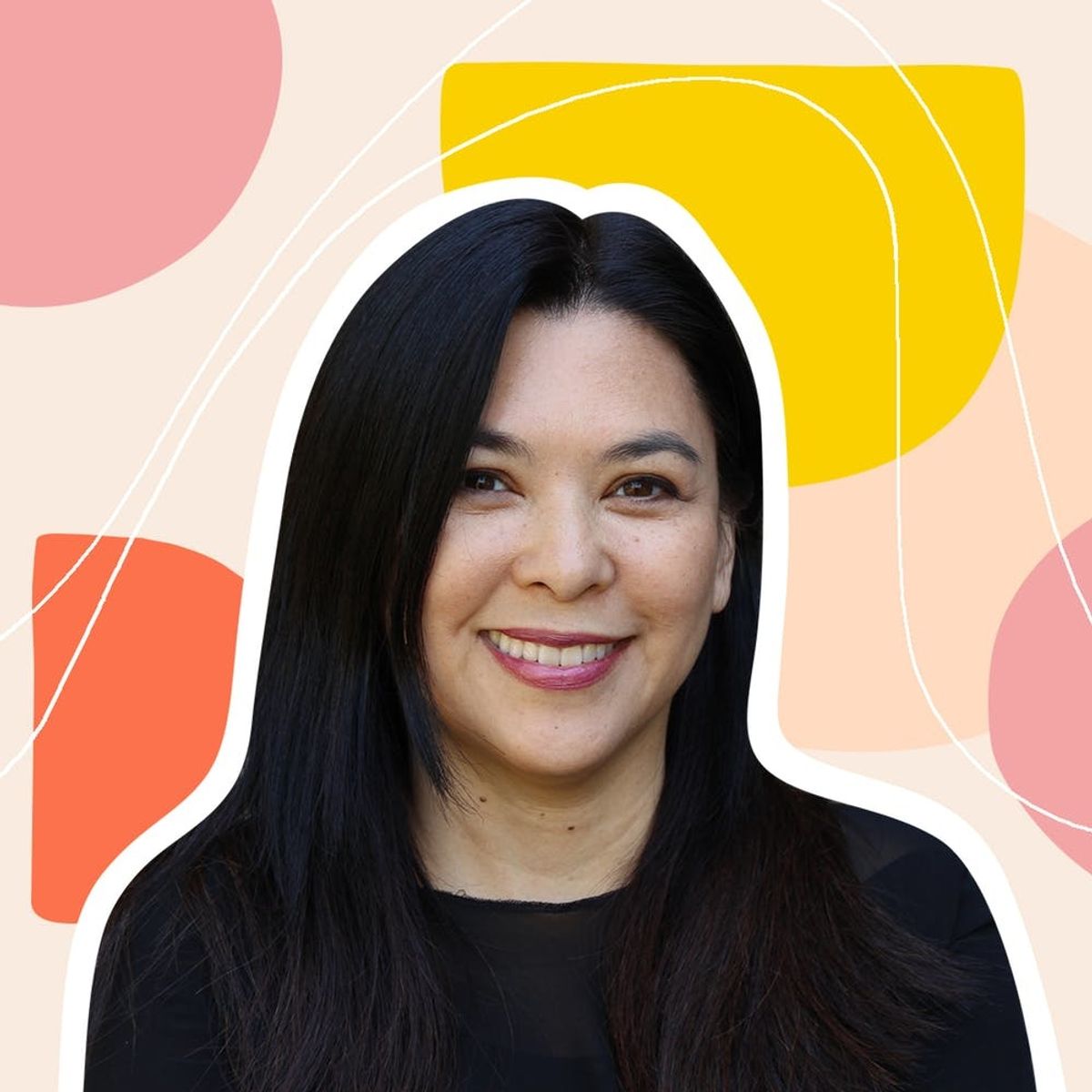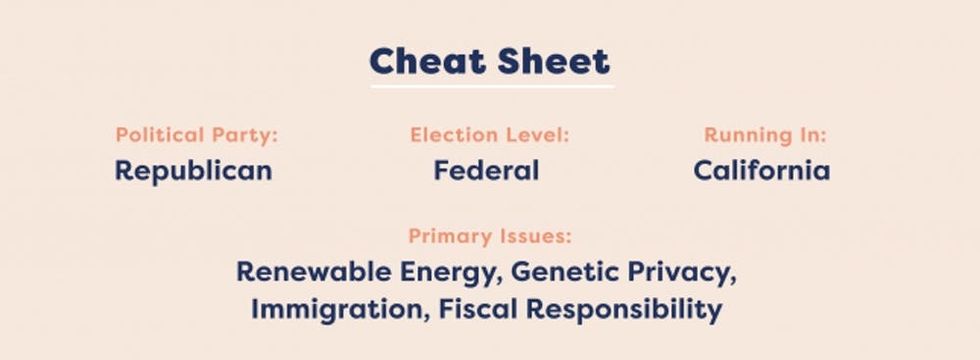This Pro-Immigration, Pro-Renewable Energy Candidate Wants to Change the Face of the Republican Party


Women Who Run highlights female political candidates on both sides of the aisle who are poised to change the face of local, state, and federal government for the better.
Once upon a time, before all the partisan bickering, there was a certain hope that politicians might meet in the center of the aisle and agree on something—anything. With the country more divided than ever on how to move forward, political ideology has pushed both sides further apart so that many centrists are feeling left out of the conversation. First-time California contender Cristina Osmeña is hoping to change that by running for U.S. Representative under the Republican ticket.
A political refugee who immigrated to the US from the Philippines at the age of six, Osmeña went on to work her way up the corporate ladder of Wall Street before transitioning to the solar energy sector where she would rise to Vice President at SunPreme. Her status as an immigrant, a minority woman, and an advocate for renewable energy doesn’t exactly align with the overall current messaging of the national party. And Osmeña isn’t shy about noting that she, and many other Californian Republican women, see themselves as classic moderate fiscal Conservatives.
“We’re a large country and I don’t think the [national Republican party] platform is completely aligned with California,” Osmeña says. “There is a wing in California called ‘New California’ where they’re trying to adapt the Republican platform to things that would be helpful to California. The traditional Republican platform might not be so consistent with California, but my platform is more consistent with the Republicans in New California.”
After winning the California primary, Osmeña is pushing for a November win and ready to get to work.

B+C: What inspired you to run for office?
Osmeña: I’m an immigrant. My story is not normal, although it is very American. I was a political exile. My entire childhood, the key events were driven by big historical events in the Philippines. We had a dictator, and we were exiled and were not allowed in the country. In the meantime, I was growing up in the United States and became very American. I decided to stay on, because I loved this country and it represented my values more than any other country. But I had this really seminal moment in my life, which was I was working on Wall Street working in New York when the Trade Towers were hit. I went through the whole experience with the country, with New York, and it really flipped the switch in me. And I think it did that for a lot of people. I’m not the only person that reacted to 9/11. People joined the armed forces—it changed their lives. It started a very slow process that made me do what I’m doing now.
I went from being an immigrant and kind of an outsider to feeling very protective of the country and would do anything to defend it. I felt ownership and the will to be involved, and I started getting more involved politically. I had a mentor at that point because I was in the financial industry, and he was a Republican trying to pull me more into the party. He told me that in 8 or 10 years I should run, that I have a very interesting story. That was awhile ago, and I didn’t really listen much. He passed away in 2016 and at that point, I started talking with other people about that idea. And that was in tandem with the prior election, when immigrants started getting vilified, in a way, I thought it was a really good time to step up to the plate and claim that I’m an immigrant and be very vocal about it to force the issue that immigrants are all shapes and sizes to add value that way. Ultimately, it was the very anti-immigrant stance that pushed me over the edge.
B+C: How did that shape your opinion on immigration reform?
Osmeña: I am pro-immigration; I am pro-strong borders. There are a lot of problems that need to be addressed, but I do think that we need to have compassion for the people are immigrating here. I think that hopefully I can take an edge off that because the conversation has become so contentious and the emotions are so combative. You see people are accosting potential immigrants, so I thought that I can take the edge of that. But, yes, I’m for secure borders and immigration is a mess. It would be nice to sit down and have everyone agree on how and when immigration should occur. I don’t agree with the administration on everything. I think we need a healthy number of illegal immigrants in this country. I think they’re an economic driver, and also help population growth. And coming from California and wanting to represent California, that’s much, much more true for California than possibly for most of the country. One of the more international districts that I come from and they’re Asian. I think robust illegal immigration is a very healthy thing and would defend that. I do think they’re entertaining the idea that legal immigration should be a lower cap and I don’t agree with that. But on the other hand, we do need to address the abuses to the system that have occurred in other ways.
If anybody can come here and fill out paperwork and claim to be a citizen—and perhaps they don’t understand the repercussions or transgressions of that—you can be a non-citizen and claim to be a citizen and avail our government subsidies that should really belong to somebody else, just by crossing the border, filling out the paperwork and saying you’re a citizen. So that happens a lot more than I even realized. Maybe one of the burdens on the socialized portion of our government might be because there were non-payers and non-citizens coming here and saying that they were. They pay the residents’ tuition for public school, for example. Many things that might have been solved with a national ID card, that has become so politicized because of our past. You can’t prove a negative. Some people are born on top of the mountain and they’re legitimately an American and don’t register. You don’t want to deprive them the benefits of being born here, but there are people who come here an avail the system. Look, it’s a very, very heavy immigrant population that I live in, and I talk with fellow immigrants about it and they brag that they’re taking pay outs they didn’t pay into.

B+C: It’s interesting that you mention you’re not fully aligned with the party regarding immigration because renewable energy is another important part of your platform. But there’s a considerable amount of support from other Republicans for fossil fuel energy. So, how do you plan to tackle these conflicting views within your own party?
Osmeña: I’m not aligned with the party on continuing to subsidize and push fossil fuels. It’s not even just a moral issue; renewable energy is cheaper now. Personally, I think we should remove government subsidies for all of these industries and let the best technology win because I’m pretty sure clean energy will win. It’s just more practical solution.
But let me give you a second answer: the Republican party, the national party—we’re a large country and I don’t think the platform is completely aligned with California. There is a wing in California called New California where they’re trying to adapt the Republican platform to things that would be helpful to California. The traditional Republican platform might not be so consistent with California, but my platform is more consistent with the Republicans in New California. As someone from California, fossil fuels are not a major contributor to our economy. Renewable energy is a more robust, dynamic industry in California. So, just from that practical perspective I want to support it. Obviously, I have ties to that industry, but it is more of a California industry to support than fossil fuels. If you look at the history of energy over time, you transition. You transition from burning wood or coals to oil, so we have normal transitions. We’re going through a normal technical transition in the energy industry. It’s interesting it’s being politicized because this is going to happen. It’s just a better solution.
B+C: What are the main issues you’ll fight if you win?
Osmeña: I’m pretty aligned with the Republicans on the fiscal conservative issues, so I would really like to be on that side of streamlining the budget, trying to drive efficiencies in the government. Typically government agencies think about budgeting and money, and mitigating that 1 trillion dollar deficit and hopefully reducing the overall size of the government. That’s an issue that’s not just my own.
An issue that’s my own—and it’s not even on my website and If I was going to run again, I’d be a lot more vocal about it—is genetic privacy. Because I think there are all of these California tech industries that are always popping up that have the potential for a huge, sweeping impacts. We have companies, like 23andMe and Ancestry.com, that are enticing people to give their DNA to them to get a sense of what their ancestry is. But they keep the DNA, and they claim to anonymize it, but they don’t because you can’t really anonymize DNA. And they’re going to take that database of DNA and it opens it up to unforeseen risks. To predict something in somebody’s life using a single gene for a certain level of accuracy. The technology is all there to use on something like this and I really think it needs to be slowed down. Our genes, our DNA, should be considered private and the property of the individual. I would try to act on that right away. I think that Congress is so behind on the implications tech can have on the economy and especially A.I. Things are accelerating at this exponential pace with A.I. development. I would typically not be for having the government get involved, but there are broader social implications that can impact the individual and their right to liberty. Those things really need to be explored at this point.
Love the context of the hard copy article. Under the section about Badass Women, they profile several candidates that support bipartisan cooperation. #RFWP #WomenInPolitics #SheShouldRun #Bipartisanship pic.twitter.com/Z25zujbOyb
— Cristina Osmeña (@CristinaOsmena) October 20, 2018
B+C: What is it specifically about the US Representative position that makes you think you can have the greatest impact in politics?
Osmeña: I had a twenty year career on Wall Street and ten years in the solar industry. And in my career on Wall Street, I was not a banker. I was tasked to study industry from scratch. So I had to learn one industry really well, and then another, and another. I really enjoy the big picture; it’s a lot of learning. Doing the job well, in my opinion, is having a very good understanding of how a system works and what a problem is on a large scale. I find that there’s an aspect of being a legislator that is similar to being an industry analyst and I feel that I have the ability to understand the economic impact of policy making. So, from an intellectual and academic perspective, it really appeals to me in that respect. The U.S. Representative position plays to what I was good at, which is: big picture, looking at the entire economy on a large scale. There are lower, less high-profile positions that appeal to me, so I wouldn’t shy away from that.
B+C: What have you learned by being a Republican in a very Democratic city?
Osmena: I have learned that the Republicans that remain are probably not as moderate as I am, and there is a need for people to represent the center. I grew up politically out of state, so the Republicans that remain in California further to the right and the Democrats are further to the left, and there’s this abandoned middle that is underrepresented. Part of the reason it’s underrepresented is that it’s not loud. It’s not something that will raise money or attract attention, so there’s this huge gap and the Republicans can fill it, but they have a name that is vilified. It’s difficult. I think culturally, for me, there might be a mishmash in terms of ideology. The ones that are in the center are very well aligned with me. There is a small group of residents that represent the center and are very much on board with each other. There’s certainly room in California to do a reformation of the Republican party. It might be taking on a momentous task, as well.
I know the Republican women are going to have a difficult time this cycle. I’ve met several of them that have run and they’re mostly consistent with me. They’re bipartisan, they’re compassionate, and they get ideas from both ideas from the aisle. I hope the trend continues. Listen, I’m a minority woman. If I was a Democrat, I would be a saint. But if I become a successful Republican, I would be a tempering force in the Republican party, and I think it would be more helpful personally.
B+C: What has posed some of the biggest challenges in your campaign so far?
Osmeña: I have two faces in California because I’m a minority, so I have my minority base, which is Filipino and very large in my district. And the Republicans, I’ve had a lukewarm reception because they’re so far to the right. But the moderates, who are the last ones to pay attention, notice me and they like my platform. So the challenges I’m coming up against are getting the Republican party to mobilize behind a moderate candidate. I’ve also had other people react with racist or sexist comments, but that’s par for the course.
B+C: As a candidate among a new generation of women running for office, where do you find there’s more opportunity to be a little bolder or easier to have a platform?
Osmeña: There’s strength in numbers. I have this moderate platform, and I was worried about being an outlier. It was the first time I have ever run and didn’t know how much of an outlier I could be and started connecting with other Republican women and realizing there were a number of us that feel the same. So it does turn us into a movement. If there were more moderate women on their side and our side, it would be quite powerful and credible change in position to take. Wouldn’t it be wonderful if all this partisan bickering would be mitigated by women?
B+C: What advice would you give to women who are interested in running for office?
Osmeña: Take it seriously and do it. Take yourself seriously because it’s really possible. Win or lose, you still achieve something, and change the world and your community. There are so many positive things about it. As long as your campaign isn’t nasty, it can really build a community. Do your research, be patient, and write down all of your ideas and topics before you run. Be as diligent as you possibly can. Because once you start running, it’s difficult to do your research. It’s a very research-intensive campaign. Be very academic as long as you possibly can before you run.
B+C: What are some ways that people can support your run?
Osmeña: You can donate. My website is osmenaforcongress.com. Small amounts are welcome, everything is meaningful. You can like me on Twitter at @cristinaosmena. And spread the word to the people in California.
(Design by Marisa Kumtong/Brit+Co)


















